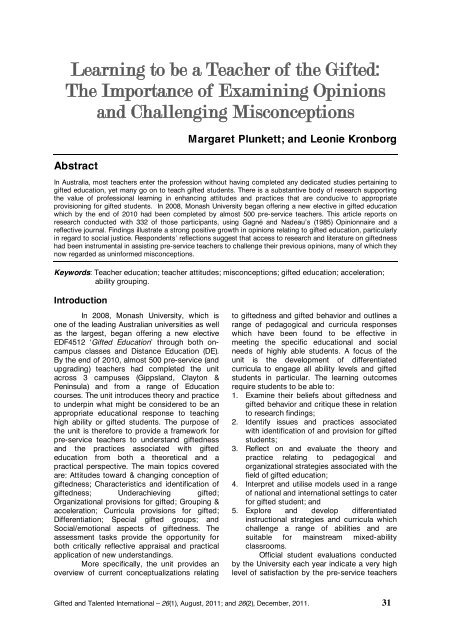The Journal of the World Council for Gifted and Talented Children
The Journal of the World Council for Gifted and Talented Children
The Journal of the World Council for Gifted and Talented Children
You also want an ePaper? Increase the reach of your titles
YUMPU automatically turns print PDFs into web optimized ePapers that Google loves.
��������������������<br />
����������������������<br />
������������������<br />
Abstract<br />
Margaret Plunkett; <strong>and</strong> Leonie Kronborg<br />
In Australia, most teachers enter <strong>the</strong> pr<strong>of</strong>ession without having completed any dedicated studies pertaining to<br />
gifted education, yet many go on to teach gifted students. <strong>The</strong>re is a substantive body <strong>of</strong> research supporting<br />
<strong>the</strong> value <strong>of</strong> pr<strong>of</strong>essional learning in enhancing attitudes <strong>and</strong> practices that are conducive to appropriate<br />
provisioning <strong>for</strong> gifted students. In 2008, Monash University began <strong>of</strong>fering a new elective in gifted education<br />
which by <strong>the</strong> end <strong>of</strong> 2010 had been completed by almost 500 pre-service teachers. This article reports on<br />
research conducted with 332 <strong>of</strong> those participants, using Gagné <strong>and</strong> Nadeau’s (1985) Opinionnaire <strong>and</strong> a<br />
reflective journal. Findings illustrate a strong positive growth in opinions relating to gifted education, particularly<br />
in regard to social justice. Respondents’ reflections suggest that access to research <strong>and</strong> literature on giftedness<br />
had been instrumental in assisting pre-service teachers to challenge <strong>the</strong>ir previous opinions, many <strong>of</strong> which <strong>the</strong>y<br />
now regarded as unin<strong>for</strong>med misconceptions.<br />
Keywords: Teacher education; teacher attitudes; misconceptions; gifted education; acceleration;<br />
ability grouping.<br />
Introduction<br />
In 2008, Monash University, which is<br />
one <strong>of</strong> <strong>the</strong> leading Australian universities as well<br />
as <strong>the</strong> largest, began <strong>of</strong>fering a new elective<br />
EDF4512 ‘<strong>Gifted</strong> Education’ through both oncampus<br />
classes <strong>and</strong> Distance Education (DE).<br />
By <strong>the</strong> end <strong>of</strong> 2010, almost 500 pre-service (<strong>and</strong><br />
upgrading) teachers had completed <strong>the</strong> unit<br />
across 3 campuses (Gippsl<strong>and</strong>, Clayton &<br />
Peninsula) <strong>and</strong> from a range <strong>of</strong> Education<br />
courses. <strong>The</strong> unit introduces <strong>the</strong>ory <strong>and</strong> practice<br />
to underpin what might be considered to be an<br />
appropriate educational response to teaching<br />
high ability or gifted students. <strong>The</strong> purpose <strong>of</strong><br />
<strong>the</strong> unit is <strong>the</strong>re<strong>for</strong>e to provide a framework <strong>for</strong><br />
pre-service teachers to underst<strong>and</strong> giftedness<br />
<strong>and</strong> <strong>the</strong> practices associated with gifted<br />
education from both a <strong>the</strong>oretical <strong>and</strong> a<br />
practical perspective. <strong>The</strong> main topics covered<br />
are: Attitudes toward & changing conception <strong>of</strong><br />
giftedness; Characteristics <strong>and</strong> identification <strong>of</strong><br />
giftedness; Underachieving gifted;<br />
Organizational provisions <strong>for</strong> gifted; Grouping &<br />
acceleration; Curricula provisions <strong>for</strong> gifted;<br />
Differentiation; Special gifted groups; <strong>and</strong><br />
Social/emotional aspects <strong>of</strong> giftedness. <strong>The</strong><br />
assessment tasks provide <strong>the</strong> opportunity <strong>for</strong><br />
both critically reflective appraisal <strong>and</strong> practical<br />
application <strong>of</strong> new underst<strong>and</strong>ings.<br />
More specifically, <strong>the</strong> unit provides an<br />
overview <strong>of</strong> current conceptualizations relating<br />
to giftedness <strong>and</strong> gifted behavior <strong>and</strong> outlines a<br />
range <strong>of</strong> pedagogical <strong>and</strong> curricula responses<br />
which have been found to be effective in<br />
meeting <strong>the</strong> specific educational <strong>and</strong> social<br />
needs <strong>of</strong> highly able students. A focus <strong>of</strong> <strong>the</strong><br />
unit is <strong>the</strong> development <strong>of</strong> differentiated<br />
curricula to engage all ability levels <strong>and</strong> gifted<br />
students in particular. <strong>The</strong> learning outcomes<br />
require students to be able to:<br />
1. Examine <strong>the</strong>ir beliefs about giftedness <strong>and</strong><br />
gifted behavior <strong>and</strong> critique <strong>the</strong>se in relation<br />
to research findings;<br />
2. Identify issues <strong>and</strong> practices associated<br />
with identification <strong>of</strong> <strong>and</strong> provision <strong>for</strong> gifted<br />
students;<br />
3. Reflect on <strong>and</strong> evaluate <strong>the</strong> <strong>the</strong>ory <strong>and</strong><br />
practice relating to pedagogical <strong>and</strong><br />
organizational strategies associated with <strong>the</strong><br />
field <strong>of</strong> gifted education;<br />
4. Interpret <strong>and</strong> utilise models used in a range<br />
<strong>of</strong> national <strong>and</strong> international settings to cater<br />
<strong>for</strong> gifted student; <strong>and</strong><br />
5. Explore <strong>and</strong> develop differentiated<br />
instructional strategies <strong>and</strong> curricula which<br />
challenge a range <strong>of</strong> abilities <strong>and</strong> are<br />
suitable <strong>for</strong> mainstream mixed-ability<br />
classrooms.<br />
Official student evaluations conducted<br />
by <strong>the</strong> University each year indicate a very high<br />
level <strong>of</strong> satisfaction by <strong>the</strong> pre-service teachers<br />
<strong>Gifted</strong> <strong>and</strong> <strong>Talented</strong> International – 26(1), August, 2011; <strong>and</strong> 26(2), December, 2011. 31


